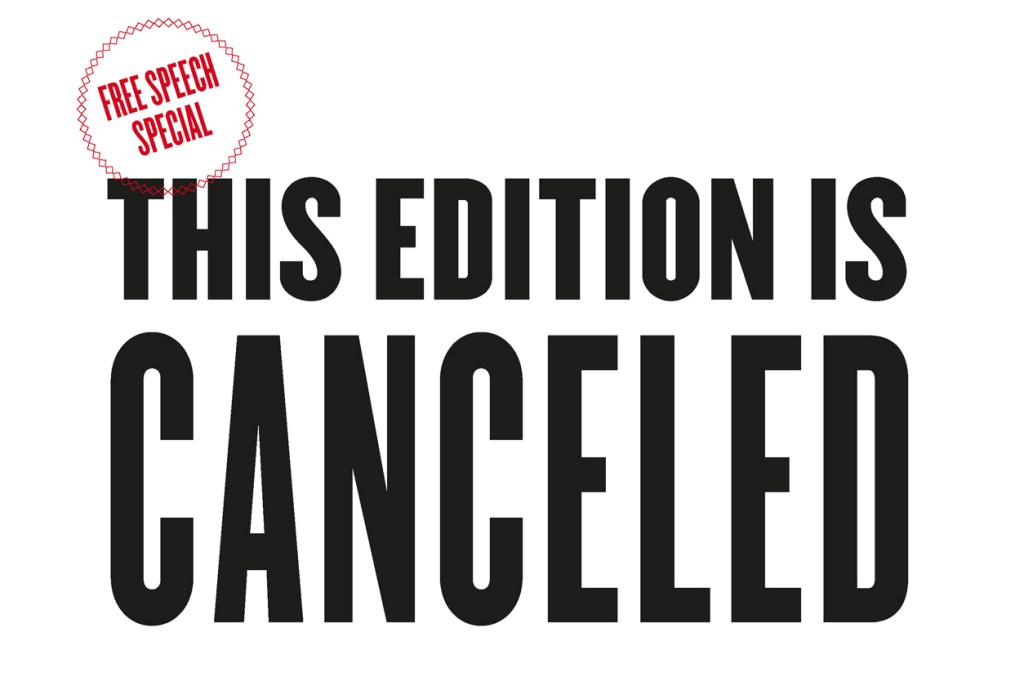De mortuis nil nisi bonum, the Romans used to say: ‘Of the dead speak only good.’ We can speak nothing else of the friend and longtime Spectator contributor we lost in January. Sir Roger Scruton was a fearless and humane advocate for art, beauty, faith, peoplehood and tradition; a fierce defender of the right to free and honest speech; and a clear-eyed advocate for the legal inheritances and cultural unity of the English-speaking peoples. He was one of the first people to undergo ordeal by ‘cancel culture’, or persecution by progressives, which is why we dedicate this free-speech issue to him.
In the early 1980s, Roger was effectively expelled from the academy for expressing conservative opinions in public. He was accused of racism and fascism in the media, and threatened with physical assault when he ventured to make the case on campus. But Roger, with the characteristic resolve that sent him behind the Iron Curtain to build the anti-communist ‘Underground University’, would not be intimidated. He refused to be canceled and, by addressing a broader public, became perhaps the most important conservative thinker since Edmund Burke.
We shall miss him. Now more than ever, we need people of Roger’s erudition, compassion and principle. Cancellation, installed in the universities as political correctness and in the media and the boardroom as cynical pandering, has become part of the institutional culture of the modern left. The appellation ‘witch hunt’ is apposite, and not just because the malice and folly of the modern cancellation resembles a digital update of The Crucible. The appeal of cancellation is deep-rooted. As Arthur Miller and the more reasonable inhabitants of old-time Salem knew, its emergence suggests a sickness in the body politic.
In many ways, cancel culture is as old as mankind. The Greeks knew that ostracism, by separating us from the living, was a fate worse than death. The Romans, who knew how to run a circus, slaked the passions of the mob by erasing unpopular emperors from official memory. George Orwell identified the same impulse in the airbrushing of Stalin’s chums in and out of Soviet propaganda. In Nineteen Eighty-Four, the Ministry of Truth sends embarrassing truths down the ‘memory hole’. Combined with various forms of intimidation, this falsification of the record is integral to the workings of ‘doublethink’.
Despite the ostensible defeat of totalitarian governments in the Cold War, a new strain has developed in the subsequent decades — a sinister intolerance that silences in the name of liberal progress. Cancel culture is that intolerance’s most unpleasant expression. It is driven by the interactions of a righteous mob and an intimidated institution. In this issue, Toby Young, Amber Athey, Gavin McInnes, Bridget Phetasy and Meghan Murphy describe how they fell foul of the mob. It’s hard to read their accounts and not be distressed and appalled.
People today are traduced for making mistakes, cracking jokes, having the wrong beliefs or just thinking out loud. Old tweets are dug up in the digital equivalent of raking through someone’s trash. Like Vyshinsky at Stalin’s show trials, the commissars of correct speech contrive a foregone conclusion from edited statements and unfounded inferences. Whether the accused defend themselves or recant, they incriminate themselves. Their guilt, and the inner corruption from which it is presumed to stem, are already known.
Concomitant with cancel culture is the idea of ‘no-platforming’. A movement that started as ‘no platform for fascists’ has, on many campuses, degenerated into ‘no platform if you disagree with me, because if you disagree with me you must be a fascist’. Where did this madness come from? Christopher Caldwell describes how judicial activism has perverted America. Since the Civil Rights Act of 1964, a ‘second constitution’ has emerged, which sets groups against each other while purporting to defend their rights. This has led to a gradual erosion of freedom in other spheres — in universities, hospitals, corporations, the media and elsewhere.
The purging of those who are accused of speaking out of order undermines the whole notion of speech being free, as implied in the First Amendment. Speech, if it’s the wrong kind, may now be very expensive indeed. John Stuart Mill, a liberal in the true and free sense of the word, warned that for exceptional talents, democracy could become a ‘tyranny of the majority’. Today, we are under a tyranny of the minority, an exceptionally motivated and institutionally empowered cadre of professional censors.
It’s time to fight back. This suffocating culture of intimidation and sadism must be resisted. In these pages, Toby Young and Douglas Murray explain how to swim against the prevailing tide of regressive ‘progress’ and unfree ‘liberty’. The Spectator has, since its founding in 1828, always stood on the side of free expression and thought. Without those freedoms, civilized society will quickly fall apart.
Conservatives are often accused of being the worst snowflakes — of falsely claiming persecution in order to experience the thrill of victimhood themselves. There is some truth in that: in a society whose prizes are increasingly awarded not for merit or effort, but through a racialized spoils system, claiming to be oppressed brings benefits. But cancel culture is real. It destroys lives, ruins careers, causes suicide and silences reasonable debate. If we are to speak at all, we must start by defending free speech.
This article was originally published in The Spectator’s February 2020 US edition. Subscribe here.

























